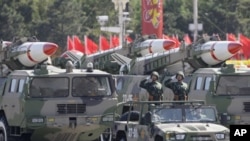Officials in Taiwan say China is upgrading its missiles aimed at the island.
In a recent appearance before parliament, Taiwan's National Security Bureau director general said China had begun deploying Dong Feng-6 ballistic missiles, which experts believe have a range of up to 1,200 kilometers.
The director, Tsai Der-sheng, calls the Dong Feng-16 a powerful new system and a heightened threat to Taiwan.
Defense officials in Taiwan say they have no further information about the weapon system and China seldom gives details on its military hardware.
But it is widely considered far ahead of Taiwan, which has been steadily falling behind in the balance of military power with its political rival of more than 60 years and now Taiwain wants new advanced weapons from the United States.
Officials in Taipai are hoping the apparent upgrade in Chinese missiles will get the attention of Washington.
US-Sino relations
The United States switched diplomatic recognition from Taipei to Beijing in 1979, but that year Congress also passed the Taiwan Relations Act, obliging Washington to sell the island enough arms for its own defense. Today, it wants the two sides to settle differences peacefully. But the United States remains Taiwan's staunchest informal ally and arms supplier.
Nathan Liu is director of the graduate school of international relations at Mingchuan University in Taiwan.
"This will give them legitimacy to ask for more defense budget [spending], for one thing," he says. "Second, I think the Taiwan security community is also worried about this increasing change between China and the United States. Obviously it's much better as compared to even five years ago, not to mention 10 years ago. Obviously now the balance among the three countries is not in Taiwan's favor, so Taiwan is getting pretty worried about that," says Lui.
Taipei seeks F-16s
Taiwan's president, Ma Ying-jeou, has stepped up pleas for new U.S. advanced weaponry over the past year, raising the issue with U.S. visitors whenever possible. His government believes China is aiming 1,900 missiles at the island and particularly wants Washington to approve a long-standing request for 66 new F-16 fighter jets.
Beijing has claimed sovereignty over self-ruled Taiwan since the 1940s and insists that the two sides eventually reunify. China has not threatened a military strike since 2005, as trade relations with Taiwan pick up.
But defense analysts believe it is more prepared than ever for a fight, if one is ever needed. People in Taiwan generally oppose full-blown unification and instead prefer a degree of autonomy for the strongly democratic island.
Warmer relations
The threat of war is low at the moment. The Taiwanese government has begun landmark negotiations with Beijing, leading to deals on trade and tourism across the Taiwan Strait. But the stronger economic ties have not built enough trust for the two sides to discuss thorny political disputes.
U.S. officials are also striving to get along better with China as it gains importance as a world economic power. The most recent planned sale of new U.S. arms to Taiwan met with a suspension of military exchanges and the threat of sanctions against U.S. defense contractors by an outraged Beijing. In January last year the Obama Administration approved selling $6.5 billion worth of helicopters and defensive missiles, among other hardware.
Alex Chiang is an associate professor of international politics at National Chengchi University in Taipei.
"The United States has to take into consideration whether Taiwan needs this kind of weapon, whether any kind of military sale to Taiwan will affect its relationship with mainland China," says Chiang. "But I think this new development probably will give the United States more consideration, maybe. in favor of a sale to Taiwan. I don't know if it will change the final decision or not, but I think overall it probably will give more opportunities to consider further or additional military sales to Taiwan."
Officials from the de facto U.S. embassy in Taipei say they are studying all of Taiwan's defense needs.
Political consultants in the United States, one staffed by former government advisers, and academics in Taiwan, believe Washington will eventually offer technical aid or upgrades to existing military systems rather than massive new packages that would upset China.











